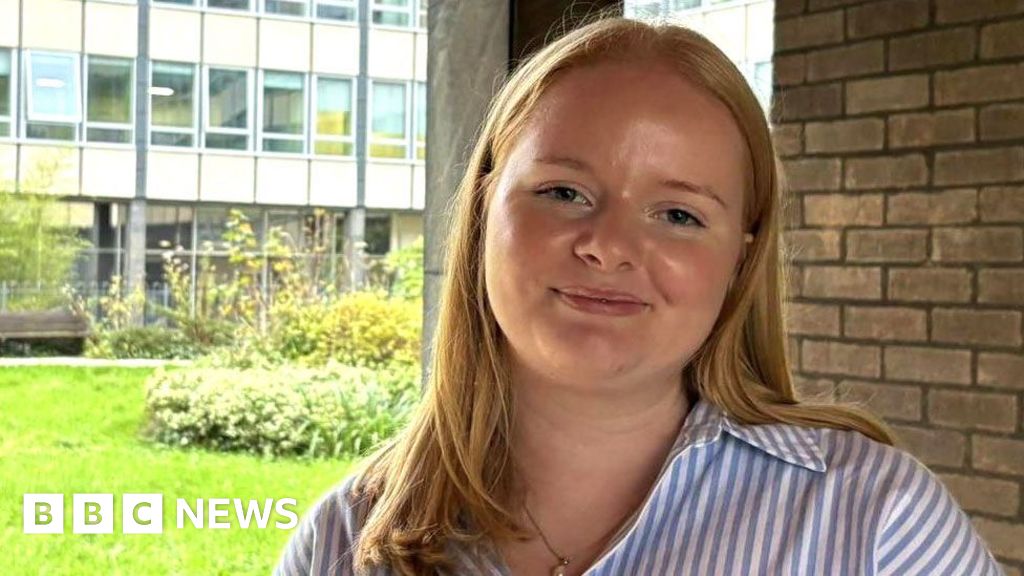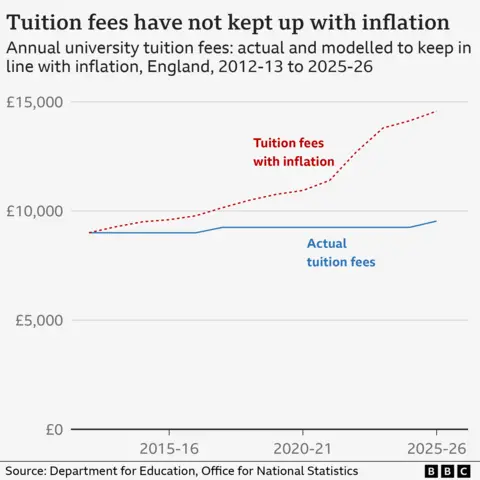İçindekiler
Bu içerikte, İngiltere’deki üniversitelerde lisans öğrencileri için ücretlerin sekiz yıl sonra ilk kez arttığından bahsedilmektedir. Bu artışın ardından, bir arkadaşı üniversiteye başlamışken diğeri ise iş hayatına atılmıştır. İşte bu artışın onlar için ne anlama geldiği ve üniversitenin maliyetine değip değmeyeceği konusu ele alınmaktadır. Birinci kişi olan Isobel, üniversiteye gitmeyi tercih etmeyerek farklı bir yol izlemiştir. İkinci kişi olan Sam ise üniversite eğitiminden memnun olduğunu ve değerli bulduğunu belirtmektedir. Üniversite eğitimine ilişkin genel maliyetler, öğrenci deneyimi ve öğretim kalitesi de içeriğin odak noktaları arasındadır. Bu içerikte, bir öğrenci yurdundan konuşarak, yeni bir şehri keşfetmekten ve “en nazik ve sevimli insanlardan bazılarıyla tanışmaktan” keyif aldığını söylüyor. Ancak Sam, her zaman para konusunda “sürekli stres” yaşadığını belirtiyor ve banka hesabını “şahin gibi” izlediğini ekliyor. Ayrıca, hükümetin ücretlerle ilgili açıklamasına yanıt olarak, kişisel finans uzmanı Sarah Coles, küçük çocukları olan ebeveynlerin üniversite yılları için şimdiden tasarruf yapmaya başlamaları gerektiğini söylüyor. Sam, haftalık alışverişinde yaklaşık 20 sterlin harcadığını ve kampüs arasındaki yolculuklarını da kendisinin karşıladığını belirtiyor. Ayrıca, haftada bir veya iki kez pub’a birkaç birayla çıktığını söylüyor. Sam’ın babası David, oğlunun üniversitede “hayat boyu arkadaşlar” edineceğini umuyor. Sam’ın kirası yıllık yaklaşık 8.500 sterlin olup, bu miktar ebeveynleri tarafından karşılanıyor. Ayrıca aylık 250 sterlinlik bir harçlık alıyor. Önümüzdeki yıl, hükümet yerli öğrenci ücretlerini artırırken, bakım kredilerinde de tavanları artıracak. Ancak kişisel finans uzmanı Martin Lewis, bakım kredilerinin ebeveynlerinden ek yardım alamayan öğrencilere yeterli olmadığını belirtiyor. Sam’ın ebeveynleri, evlerini Airbnb olarak ayarlayarak Sam ve ablasını üniversiteye desteklemek için bir yol bulduklarını söylüyor. David, öğrencilerin erişimlerinde ve Covid öncesi sahip oldukları aynı ekstra öğrenme fırsatlarında (geziler ve stajlar gibi) öğretmenlere ve para karşılığında değer alıp almadıklarında “giden ücreti ödemenin yanlısı” olduğunu söylüyor. Ancak maliyetler daha da artarsa, çocuklarına mali destek sağlamak için “ne yapabileceğimiz konusunda zorlu bir konuşma yapılması gerekeceğini” ekliyor. David, Sam’in üniversitedeki zamanının sadece bir derece olmaktan öteye daha fazla değer taşımasını umduğunu belirtiyor. Son olarak, Hükümet, üniversiteleri “daha sağlam bir mali temele oturtmayı” umuyor. Üniversiteler, 2012’de yıllık 9.000 sterline yükseldikten sonra sadece 250 sterlin arttı. Bu durum üniversiteleri giderek yüksek ücretler ödeyen uluslararası öğrencilere bağımlı hale getirdi. Ancak daha sıkı vize kuralları, Birleşik Krallık üniversitelerine başvuran yabancı öğrenci sayısının azaldığını göstermektedir. Hükümetin son ücret artışı, mevcut öğretim maliyetlerini karşılamak için yeterli olduğunu savunduğu 12.000-13.000 sterlinlik üniversitelerin aksine oldukça azdır. Hükümet, potansiyel kurtarma operasyonları için çağrılarda bulunurken ve üniversitelerin bu yıl mali açıkta olabileceği uyarıları yapılırken, önceki yıllarda üniversitelere kendi finanslarını düzeltmeleri talimatı vermişti. Genel olarak, Yükseköğretim İstatistik Ajansı tarafından yapılan araştırma, mezunların çoğunun mezun olmayanlardan daha fazla kazanmasını bekleyebileceğini göstermektedir. Ayrıca, Save the Student para tavsiye web sitesi, son ücret artışının “öğrenci borç seviyelerine pek bir fark yaratmayacağını ve mezunun her ay geri ödediği miktarı hiçbir şekilde etkilemeyeceğini” söyledi. Ancak daha fazla borçlanmak, kaçınılmaz olarak öğrencilerin daha fazla borçla üniversiteden ayrılmasına neden olacaktır. Hükümetin son duyurusu sadece 2025-26 akademik yılındaki ücretleri ve kredileri belirtmektedir. Bu içerik, içerik oluşturma sürecinde içerik açıklaması oluşturmanın önemini vurgulamaktadır. İçerik açıklaması, bir metnin kısa ve öz bir şekilde özetlenmesidir. İçerik açıklaması, okuyucuların içeriğin konusunu, amacını ve önemli noktalarını hızlıca anlamalarına yardımcı olur. İçerik açıklaması oluşturmak, içeriğin etkili ve kolay anlaşılabilir olmasını sağlar. Bu içeriğin içerik açıklaması oluşturulmasıyla, okuyucuların içeriğin ne hakkında olduğunu daha iyi anlamaları ve içeriği daha etkili bir şekilde değerlendirmeleri sağlanacaktır. Bu içerik, içerik oluşturma sürecinde kullanılacak açıklamaların nasıl oluşturulacağını detaylı bir şekilde anlatmaktadır. İçerik açıklaması oluşturmanın önemi ve nasıl etkili bir şekilde yapılabileceği konularına odaklanmaktadır. İçerik açıklamasının içeriğin hedef kitlesiyle iletişim kurmada önemli bir rol oynadığı vurgulanmaktadır. Ayrıca içerik açıklamasının içeriğin SEO performansını artırma konusundaki etkisi de ele alınmaktadır. Bu içerik, içerik oluşturucuların ve dijital pazarlamacıların içerik açıklamalarını daha etkili bir şekilde oluşturmalarına yardımcı olmayı amaçlamaktadır.
Kaynak: www.bbc.com












Yorumlar kapalı.